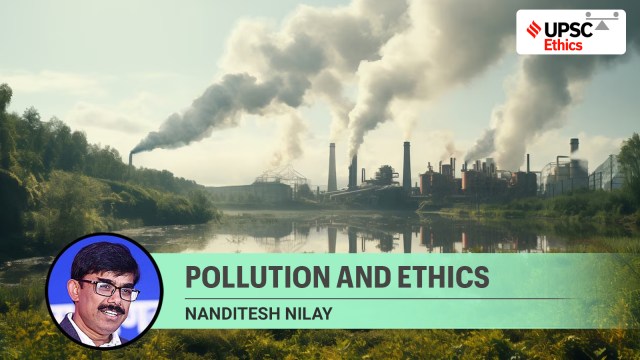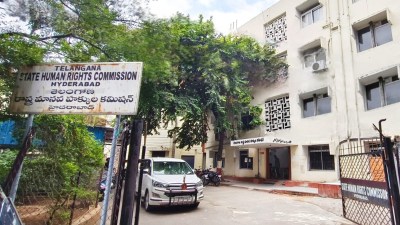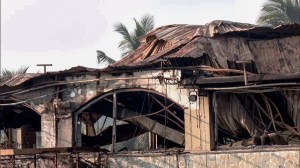UPSC Ethics Simplified | Why applying ethics to air pollution is the need of the hour?
'We cannot expect only the Supreme Court to think about the lungs of people. Shouldn't we all think more ethically to remove pollution from the environment?' Nanditesh Nilay insists aspirants to view contemporary issues from an ethical perspective too.
 'We know well that money is the greatest denominator for any developing country where elections are blindly fought on historical chunawi muddas of Garibi and Berojgari,' says Nanditesh Nilay.
'We know well that money is the greatest denominator for any developing country where elections are blindly fought on historical chunawi muddas of Garibi and Berojgari,' says Nanditesh Nilay.Relevance: UPSC Ethics Simplified draws your attention to topics related to applied ethics. UPSC recently has been focussing on contemporary issues and raising some ethical questions for the candidates. In the past, we have covered war and ethics. Today, Nanditesh Nilay, who writes fortnightly for UPSC Essentials, wears his ethical glasses to view another important issue that requires our immediate attention — Air Pollution.
Let’s begin by remembering the poem by William Wordsworth:
“The world is too much with us, late and soon,
Getting and spending, we lay waste our powers…”
Wordsworth’s disappointment with mankind is so visible and related to our present time which is blurry and dark. We are travellers in this world but do we belong to this world? If yes, why do we fail in healing the environment? Our environment needs more human values-stamina rather than competency-based stamina from all those human beings who are more near to profit margin. Don’t we need to think more sensitively and compassionately to remove pollution from the natural sky? The middle and upper classes loved to be referred to as important intellectuals. But do they think about the entropic relationship between man and nature? In all these above questions where are the haves not? What about them? Ponder.
Let’s ask a few more fundamental questions. Are we self-aware and self-regulated individuals? Are we wise and compassionate? If the answer is yes, then why are we not able to save our lungs in the post-pandemic time? It was our lungs that got defeated by COVID-19 and now pollution and an alarming air index are enveloping the whole environment, and defeating the meaning of life. Why have we not learned anything from the catastrophe of the pandemic? It is not death but life that marks the relevance of Herbert Spencer or Charles Darwin’s survival of the fittest idea. We are still surviving in times of pollution. Aldous Huxley said, “Maybe this world is another planet’s hell.”
Now let’s try to see this dark world of man-created pollution. For a farmer, their fields, gardens, and nests are that piece of land under the open sky. Now the question is whether it is fair to put all the blame on them for that stubble burning. Many industries are using garbage for generating energy and thus helping the people and environment. Why can we not create a system through a public-private partnership to buy all Stubble from farmers in advance? Is it so difficult? We have witnessed the goodness in decision-making for human beings at the time of COVID when vaccination became a possibility for the whole nation.
Recently the Supreme Court asked whether children of tenth and twelfth have different kinds of lungs. The Supreme Court asked all state governments in Delhi & NCR to close the schools. Why do we wait for the Supreme Court to take all calls for goodness and humanity too? Is compassion and care not a part of ethical decision-making at various levels in institutions? If yes, why then wait for the judiciary to intervene? Compassionate governance for a developing country like India is a must and decision-making must be done with a steadfast approach to human relationships. Law can be coded in letter and spirit by courts but general compassion and care have to be part of governance and normal life.
Now what about poor people in India? Do they not possess equal rights for clean air like rich people? They don’t possess air purifiers. We know well that money is the greatest denominator for any developing country where elections are blindly fought on historical chunawi muddas of Garibi and Berojgari. After the voting, what about those people who clean our roads, schools, hospitals, offices, and what about their lives? They do not even wear masks. Is it not a sign of healthy democracy where a poor person’s life must be treated with those constitutional values of equality and fraternity? Why should wearing a mask be compulsory? Why is there no general pain and concern for all those poor people who qualify for clean air like the rich? In the pandemic time, it was such a satisfying sight to see everyone getting vaccinated. But the present polluted environment asks us to make care and compassion a general way of living and this is nothing but ethics in governance.
There are lakhs of cars running on the road and in a family of four, there are a minimum of two cars. Should we not think about our role in increasing the pollution and earth’s temperature? What are we doing with ACs especially the centralised ones in every room or moving alone in SUVs? Are we not guilty? Why should we only target those Tuk Tuk or other vehicles? And what about those trucks and the pathetic lives of drivers and conductors? Why are some cities in the world turning into gas chambers? The reasons are simple. We the people or sisters and brothers are more seen as rich and poor. So the urgency of compassionate decision-making for this type of pollution is missing.
We are living with a pandemic experience where the pre-pandemic and post-pandemic world cannot be the same. But as we have observed, we are nothing but apathetic individuals. Why so? Why is global warming not breaking the slumber of mankind? The water crisis, air pollution, hunger, poverty, and many fundamental issues are not at the center of human reasoning. Why? Are we not willing to learn that Covid has taken our dreams? Every conversation across the globe is becoming political. No problem. But life is not at the mercy of power or politics but politics with the spirit of service. Care and compassion have to be a general life conversation for people. But who will do it? Who will lead it? Only leaders. There must be a uniformity of citizens conduct across the globe and it must be nothing less than sounding moral and ethical.
Seeing children under the mask coughing, allergic, and becoming asthmatic is a painful sight. We cannot expect only the Supreme Court to think about the lungs of people. Let’s goodness coruscate and the world can find that panoramic view of mankind under the clean air.
Let’s conclude with the first stanza of the poem ‘Childhood’ by Markus Natten,
“When did my childhood go?
Was it the day I ceased to be eleven,
Was it the time I realised that Hell and Heaven,
Could not be found in Geography,
And therefore, could not be,
Was that the day!”
Let’s save childhood and humanity by being less of a stranger in this world. Time has arrived to coalesce and enlighten with Summum Bonum or that ultimate goodness.
Point to ponder: Lungs are secular and so is life. Comment.
(The writer is the author of ‘Being Good and Aaiye, Insaan Banaen’, ‘Ethikos: Stories Searching Happiness’ and ‘Kyon’. He teaches courses on and offers training in ethics, values and behaviour. He has been the expert/consultant to UPSC, SAARC countries, Civil services Academy, National Centre for Good Governance, Central Bureau of Investigation (CBI), Competition Commission of India (CCI), etc. He has PhD in two disciplines and has been a Doctoral Fellow in Gandhian Studies from ICSSR. His second PhD is from IIT Delhi on Ethical Decision Making among Indian Bureaucrats. He writes for the UPSC Ethics Simplified (concepts and caselets) fortnightly.)
Subscribe to our UPSC newsletter and stay updated with the news cues from the past week.
Stay updated with the latest UPSC articles by joining our Telegram channel – Indian Express UPSC Hub, and follow us on Instagram and X.
For your queries and suggestions write at manas.srivastava@indianexpress.com.
UPSC Magazine

Read UPSC Magazine
- 01
- 02
- 03
- 04
- 05































